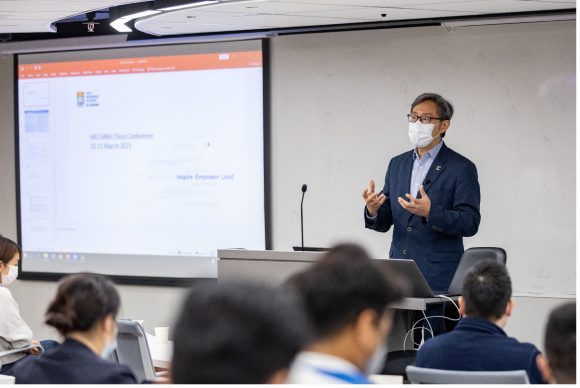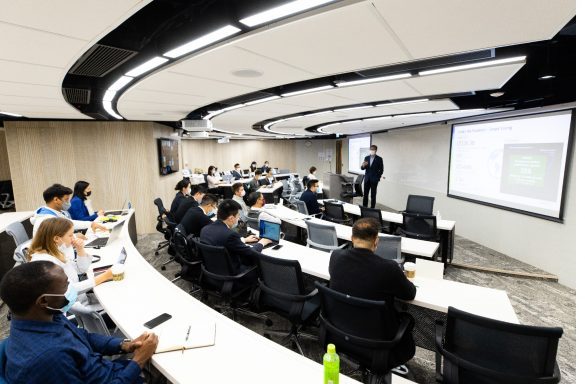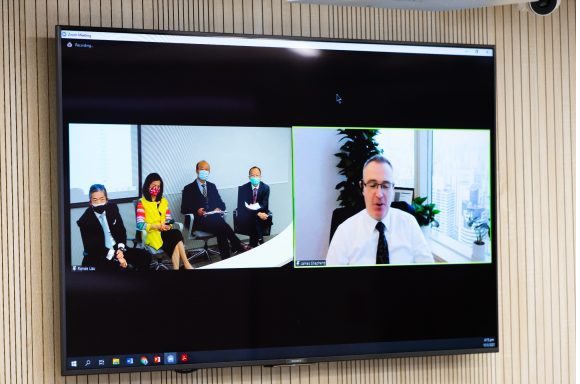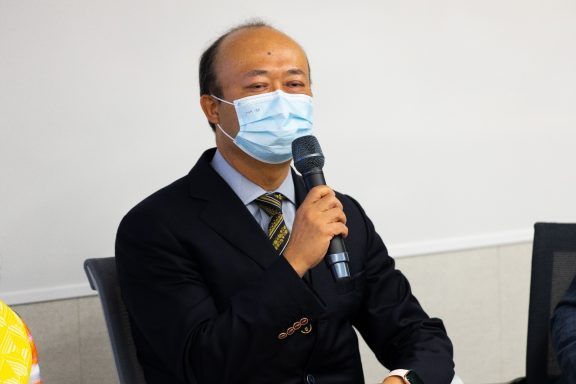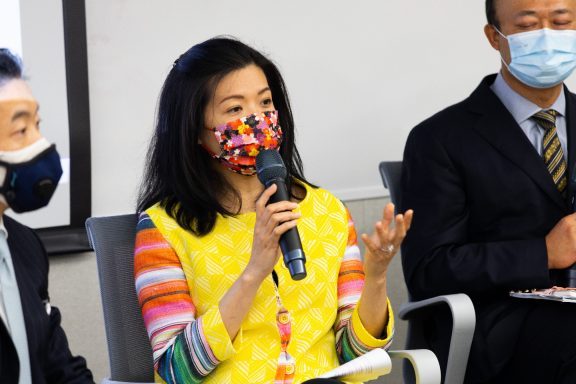Quicklinks
China Immersion Programme (Part II) Day 1
10 Mar 2021
The two-day China Immersion Programme finished last week, and we are honoured to have had so many elites be our guest speakers, sharing with us valuable insights into China’s
business markets.
The programme was kick started by our honourable speaker Mr. Peter Yan, CEO of Cyberport. He shared his expertise on the growth of data and the cloud, the development of health and education technology, and the emerging industry in China - Fintech. Peter also discussed the growth of China’s GDP and highlighted the size of the market.
Peter then invited Cindy Chow, the Executive Director of Alibaba Entrepreneurs Fund and Calvin Ng, the Alternate Chief Executive, Co-Head of Retail Banking, ZA Bank who held a presentation on the development of technology in China and its subsequent impact in creating opportunities for venture capital, investors and the Fintech industry.
In the afternoon of day one, HKU MBA invited Dr. Maurice Tse, our Finance Principal Lecturer speak on digital currencies in China. The session was followed by a panel discussion consisting of Maryann Tseng, Managing Director and Head of ECM, Corporate Finance & Capital Markets Division, China Merchants Securities International Co. Ltd; Jianing Song, Partner, Financial Services Advisory, Head of HK Banking Advisory, KPMG China (also an EMBA-Global Asia Alumni); James Shepherd, Head of Business Development Services, Greater China, Cushman & Wakefield; Peter Wong, Executive Director, Structured Solution Development, GCNA/Global Industry Leader for Insurance, Standard Chartered (also an MBA alumni).
The panel discussion was moderated by HKU Business School Associate Dean, Professor Yuk Fai Fong. The panellists discussed the economic outlook for China and shared their personal experiences of how they started their career in China while giving some insights into the country’s markets. Insights included how to evaluate and manage assets bubble in China and a comparison of the Global Financial Crisis in 2008 and the 2020 Covid-19 Pandemic. They also shared their experiences of how to manage high wealth customers in China and how to navigate private wealth distribution channels.
The panel finished with a Q&A session where students raised questions regarding the impact of Covid-19 on the global markets. They also asked about the future of Hong Kong under the current climate of uncertainty. The panellists responded positively to the questions by commenting on Hong Kong’s low tax regime, strong legal system, free financial transactions, trade easiness and its role as a corridor to the China market. They highlighted that being a corridor would definitely bring bigger opportunities to the city and that the city’s solid position as an international business hub would not be shaken easily.
All the sessions offered a wealth of knowledge and information about China economy and business culture which was very valuable and impactful.
The programme was kick started by our honourable speaker Mr. Peter Yan, CEO of Cyberport. He shared his expertise on the growth of data and the cloud, the development of health and education technology, and the emerging industry in China - Fintech. Peter also discussed the growth of China’s GDP and highlighted the size of the market.
Peter then invited Cindy Chow, the Executive Director of Alibaba Entrepreneurs Fund and Calvin Ng, the Alternate Chief Executive, Co-Head of Retail Banking, ZA Bank who held a presentation on the development of technology in China and its subsequent impact in creating opportunities for venture capital, investors and the Fintech industry.
In the afternoon of day one, HKU MBA invited Dr. Maurice Tse, our Finance Principal Lecturer speak on digital currencies in China. The session was followed by a panel discussion consisting of Maryann Tseng, Managing Director and Head of ECM, Corporate Finance & Capital Markets Division, China Merchants Securities International Co. Ltd; Jianing Song, Partner, Financial Services Advisory, Head of HK Banking Advisory, KPMG China (also an EMBA-Global Asia Alumni); James Shepherd, Head of Business Development Services, Greater China, Cushman & Wakefield; Peter Wong, Executive Director, Structured Solution Development, GCNA/Global Industry Leader for Insurance, Standard Chartered (also an MBA alumni).
The panel discussion was moderated by HKU Business School Associate Dean, Professor Yuk Fai Fong. The panellists discussed the economic outlook for China and shared their personal experiences of how they started their career in China while giving some insights into the country’s markets. Insights included how to evaluate and manage assets bubble in China and a comparison of the Global Financial Crisis in 2008 and the 2020 Covid-19 Pandemic. They also shared their experiences of how to manage high wealth customers in China and how to navigate private wealth distribution channels.
The panel finished with a Q&A session where students raised questions regarding the impact of Covid-19 on the global markets. They also asked about the future of Hong Kong under the current climate of uncertainty. The panellists responded positively to the questions by commenting on Hong Kong’s low tax regime, strong legal system, free financial transactions, trade easiness and its role as a corridor to the China market. They highlighted that being a corridor would definitely bring bigger opportunities to the city and that the city’s solid position as an international business hub would not be shaken easily.
All the sessions offered a wealth of knowledge and information about China economy and business culture which was very valuable and impactful.
Click here for more details of China Immersion Programme














